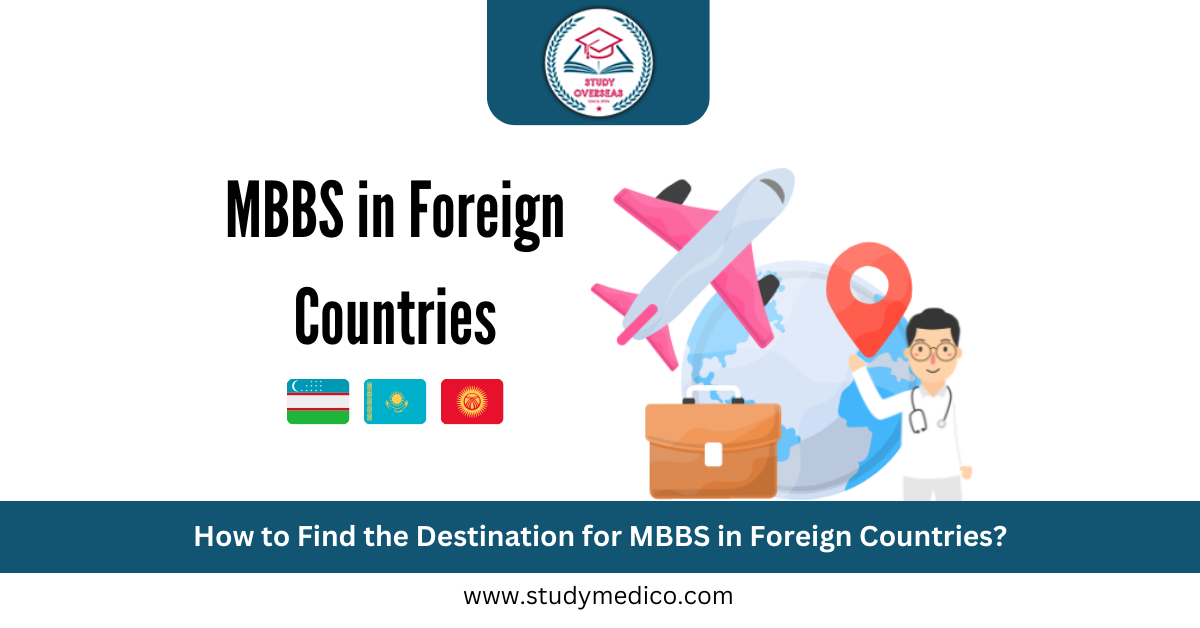MBBS in Foreign Countries: If you possess an internationally recognized medical degree acknowledged by the Medical Council of India, you will undoubtedly receive a warm welcome and recognition from leading hospitals both in India and abroad. This is precisely why many aspiring medical students in India choose to pursue their MBBS programs in foreign countries, particularly in Europe. Apart from global acclaim, obtaining an MBBS degree in a top study destination overseas is significantly more affordable than in India. Studying MBBS in foreign countries also provides a once-in-a-lifetime experience and grants students international exposure through exceptional seminars, workshops, and conferences. Countries like China, Russia, Uzbekistan, Germany, Poland, etc., offer students access to cutting-edge surgical tools, state-of-the-art infrastructure, and advanced medical systems.
Additionally, Indian students can engage in conversations with distinguished faculty members and prepare for the MCI Screening Test, enabling them to practice in India immediately after completing their degrees.
Also Read:
Top Advantages Of Pursuing MBBS Abroad!
How to Find the Destination for MBBS in Foreign Countries?
Pursuing an MBBS degree in an abroad country can open up a world of opportunities for aspiring medical professionals. To find the ideal destination for your studies, consider the following factors:
1. Quality of Education
The quality of education should be your top priority when selecting a destination for MBBS studies. Look for countries that have well-established and renowned medical universities with a strong reputation for delivering high-quality education. Check if the universities are recognized by international medical bodies such as the World Health Organization (WHO) and the Medical Council of your home country.
2. Accreditation and Recognition
It's crucial to ensure that the medical universities and colleges in your chosen destination are accredited and recognized by relevant authorities. Accreditation ensures that the institution meets certain standards of education and provides valid degrees. This recognition will be vital when you apply for jobs or pursue further studies in your home country or other parts of the world.
3. Language of Instruction
Consider the language of instruction at the universities in your desired destination. If the medium of instruction is not your native language, assess your proficiency in the language and determine if you are comfortable studying in that language. Some universities may offer MBBS programs in English, while others may require you to learn the local language.
4. Cost of Education
Finances play a crucial role in selecting a destination for MBBS studies. Research and compare the tuition fees, living expenses, and other associated costs in different countries. Take into account scholarships, grants, and financial aid options that may be available for international students. Remember to consider the overall cost of living in the country as well.
5. Safety and Security
Ensure that the country you choose provides a safe and secure environment for international students. Research the crime rates, political stability, and healthcare facilities in the country. It's important to feel safe and comfortable during your stay abroad, especially when pursuing a demanding course like MBBS.
6. Culture and Lifestyle
Studying abroad is not just about academics; it's also an opportunity to immerse yourself in a new culture and experience a different way of life. Consider the cultural aspects, lifestyle, and social environment of the country you are interested in. Think about whether you can adapt to the local customs, traditions, and climate.
7. Career Opportunities
Evaluate the career opportunities available in your chosen destination. Look for countries that have a demand for skilled medical professionals and offer good prospects for employment or further specialization. Consider the availability of internships, clinical rotations, and research opportunities that can enhance your practical skills and knowledge.
8. Student Support Services
Consider the availability of student support services provided by the universities. These services can include academic counseling, career guidance, accommodation assistance, and extracurricular activities. A supportive environment can greatly enhance your overall experience as an international student.
9. Networking and Alumni
Explore the networking opportunities and alumni networks offered by the universities. Connecting with professionals and alumni in your field can provide valuable insights, mentorship, and potential career opportunities. Research the success stories of alumni from different universities to gauge their impact on the medical community.
10. Visa and Immigration Policies
Familiarize yourself with the visa and immigration policies of the country you intend to study in. Understand the requirements, application process, and any restrictions that may apply to international students. Make sure you have a clear understanding of the necessary documents and timelines to avoid any last-minute complications.
Also Read:
Why Indian Students Should Consider MBBS In Russia?
FAQs: MBBS in Foreign Countries
1: Are there scholarships available for international students pursuing MBBS in foreign countries?
Yes, many countries offer scholarships and financial aid options for international students pursuing MBBS degrees. Research the scholarship opportunities provided by different governments, universities, and organizations to find suitable funding options for your studies.
2: Can I work part-time while studying MBBS abroad?
The part-time work opportunities for international students vary depending on the country and its regulations. Some countries allow international students to work part-time during their studies to support themselves financially. However, it's essential to familiarize yourself with the specific rules and limitations imposed by the immigration authorities of the country you choose.
3: Will the degree obtained from a foreign country be recognized in my home country?
The recognition of a foreign MBBS degree depends on the regulations and requirements of your home country's medical council or licensing authority. Before choosing a destination, check if the medical degree obtained from that country is recognized in your home country. It may require additional exams or procedures to practice medicine in your home country after completing your degree abroad.
4: How do I choose between studying in an English-speaking country or a non-English-speaking country?
Choosing between an English-speaking country and a non-English-speaking country depends on your language proficiency and comfort level. If you are fluent in English and prefer studying in that language, consider countries like the United States, the United Kingdom, Canada, or Australia. However, if you are open to learning a new language and experiencing a different culture, you can explore non-English-speaking countries like Germany, Russia, or China.
5: Can I return to my home country to practice medicine after completing my MBBS abroad?
In most cases, yes, you can return to your home country to practice medicine after completing your MBBS abroad. However, you may need to fulfill certain requirements set by your home country's medical council or licensing authority. These requirements may include clearing licensing exams or completing a specific period of internship or residency.
Conclusion: MBBS in Foreign Countries
Selecting the right destination for MBBS studies in a foreign country is a significant decision that requires careful consideration of various factors. Assess the quality of education, accreditation, language of instruction, costs, safety, cultural fit, career opportunities, and student support services. Research the visa and immigration policies and ensure the degree's recognition in your home country. By thoroughly evaluating these factors, you can make an informed choice that aligns with your goals and aspirations as a future medical professional.
Also Read:





